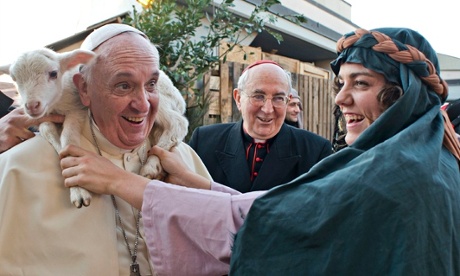Pope Francis has done little to improve women’s lives
Women do not seem to have a place in the pope’s vision of a Catholic church that cares for the world’s poor people

He has also acknowledged the need to give women a greater say in the life of the church, though he has done little to achieve this. Yet poverty impacts unrelentingly and acutely on women’s lives, and nowhere does the absence of women’s influence manifest itself so clearly as around the church’s teachings on sexual and reproductive ethics.
While papal encyclicals abound with negative references to contraception and abortion and positive references to motherhood, marriage and the family, one can search in vain for any discussion of maternal mortality. Like his predecessors, Pope Francis has a tendency towards romanticism when speaking about motherhood. This is a dangerous fantasy when it occludes the harsh realities and struggles of women’s reproductive lives.
If the pope wants a church that prioritises the needs of the poor, then addressing women’s reproductive wellbeing is fundamental to that goal. Maternal mortality is often a direct consequence of poverty. Of an estimated 280,000 maternal deaths a year, 99% occur in the world’s poorest countries – mostly in sub-Saharan Africa and south Asia. Good obstetric care would prevent most of these deaths, but issues of contraception and abortion raise more contested ethical issues.
I do not defend the Catholic church’s position on contraception. However, it is important to separate women’s reproductive rights from contraceptive programmes linked to population control policies. Feminists speaking for the global south, such as Kalpana Wilson, argue that these are driven by exploitative economic policies and are often deeply coercive. Paradoxically, when working documents for the 1994 International Conference on Population and Development in Cairo included a heavy emphasis on population control, the Catholic church and the international women’s movement, though deeply hostile to each other, campaigned effectively to refocus the international development agenda away from population control to women’s education and empowerment.
Recent research shows that the most effective way of reducing birth rates is through female education, which also has a significant impact on reducing infant mortality. An educated woman who knows that her children are likely to survive will have fewer children than women in areas with high infant mortality rates and poor access to education. It is also interesting to watch Hans Rosling’s TED talk, in which he shows that birth rates stabilise or decrease when poverty is reduced, irrespective of religious influences.
None of this is to deny that access to safe, reliable and affordable contraception is important if women are to exercise reproductive choices. However, while a change in the church’s teaching on contraception may be long overdue, this must not translate into an uncritical endorsement of contraceptive programmes inflicted on the world’s poor. Rather, the international community must focus on poverty alleviation and the education and empowerment of women and girls, not only because justice demands it but because it has been shown to be the most effective way of tackling the population crisis.
The abortion issue has similar implications, though most Catholics I know regard this as a more complex ethical issue than contraception. I know few who would agree that it is simply a question of individual autonomy and a woman’s right to choose, though that does not mean they support criminalising abortion. The church says abortion is always wrong; feminists say it is always a right, but in the real world we sometimes face complex moral dilemmas where rights and wrongs are not so easily distinguished.
The polemical nature of the debate means that statistics – which are already unreliable – are manipulated by both sides. Opponents of abortion argue that access to abortion does not reduce maternal deaths, pointing to the fact that countries such as Chile and Ireland have very low maternal mortality rates despite abortion being illegal. However, such claims ignore the fact that 40,000 women die every year because they would rather risk an unsafe abortion than carry an unwanted pregnancy to term. While early pregnancy might rarely be a direct cause of maternal death, unsafe abortion most certainly is. These issues must be acknowledged in any debate about the Catholic church and women’s reproductive and sexual rights, particularly with regards to poverty and motherhood.
At a grassroots level, Catholic agencies and religious orders are major providers of education and healthcare to the world’s poor. This includes providing antenatal and obstetric care, dealing with the consequences of botched abortions, and caring for people living with HIV and Aids. However, some of this work goes on under the radar. Catholic healthcare providers are often afraid to publicise some aspects of their work – such as post-abortion care or supplying condoms to those at risk of HIV and Aids – in case their funding is cut off or they are censured by their bishops.
If he is serious about wanting a poor church of the poor, the pope has to create a safe space in which these issues can be discussed. He has said that he prefers “a church which is bruised, hurting and dirty because it has been out on the streets, rather than a church which is unhealthy from being confined and from clinging to its own security”. He has emphasised the maternal character of the church, and he says he wants a church in which the shepherds smell of the sheep. How about a maternal church in which the shepherds smell of bruised, hurting and dirty women dying in childbirth?